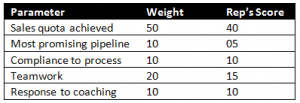How To Create Sales Incentive Plan
Incentive Plan Ideas for Your Sales Team
- 23 July 2020
- 7 mins
A good incentive plan brings the sales team together to work toward a common goal while fostering a friendly atmosphere and healthy competition. Ideally, incentive plans should promote a desired behavior or result, but sometimes they miss the mark. It may be because they are lopsided, lack any genuine motivational element, or are simply uninspiring.

Sales managers and leaders are responsible for creating an effective incentive plan, and the key to it is rewarding the right behavior. Incentive programs are either monetary or non-monetary. The monetary programs are quite straightforward, as they are designed to reward certain behavior. The non-monetary incentive plans are more suited to increasing motivation, team bonding, and at times, employee retention.
Keys to a Successful Sales Incentive Program
A few things to keep in mind while developing the right incentive plans for your organization:
- Incent the behavior, not the result. To measure your employees' performance versus their effort, tie their behavior to the incentive plan. For example, salespeople typically don't enjoy maintaining regular time sheets, updating their pipeline, or scheduling follow-up tasks. They tend to take short cuts or even skip these tasks. Tying consistent behavior with incentives will encourage your team to complete these very necessary responsibilities.
- Create a sales incentive plan that helps everyone to succeed. Avoid creating plans that will only reward your top performers. Dig deep for parameters that will help turn the entire team into a productive sales unit. A good incentive plan motivates average and below average performers to push beyond their comfort zones. If your incentive plans consistently reward the same top salespeople, other reps may lose interest. For example, to engage every sales rep, include incentives for process compliance. That way the plan can reward even poor performers for achieving some type of objective. You can also create plans with many parameters, and assign each a varying degree of importance. For example:

This way all reps have something extra to work on besides their sales quotas. When they work on these parameters to qualify for the plan, they automatically work towards becoming better sales reps. You can decide the priority for your organization while designing the plan.
3. Set incentive timelines strategically. Sales incentive plans should have a specific timeframe that aligns with your department's objectives. To support corporate interests, incentive plans can also be timed to coincide with sales cycles, performance appraisals and time-based performance goals.
4. Acknowledge the importance of failures. It is true that in the end, all that matters is the bottom line. But the path to the bottom line is paved with a lot of near-misses, unexpected losses, and outright rejections. Set up an acknowledgment program or even a small reward for someone who has heard the word "no" the most, to show that you appreciate the effort. Then ensure that rep gets the extra support required to close deals in the next cycle. Figure out if the rejection was due to a flaw in sales process execution or if it was just a rare case of bad luck. If it's the former, set an internal target for lowering the rejection rate.
5. Build transparency into the plan. By publicly tracking data, especially metrics that sales reps can control, at any given time they will know their progress toward their goal.
6. Consider group incentives. Group compensation can be a way to increase productivity when sales reps are interdependent, such as in project-based jobs where team members must reach specific milestones before others on the team can advance. Often, with group-based incentives, individuals may perform at higher levels to not be perceived as letting down the team.
7. Recognize innovative approaches that increase sales productivity. If you see a sales rep employing a better way to execute a regular or recurring task, such as filing expense claims, acknowledge their innovation as fast as possible. Offer a reward or recognition or both to show your appreciation and encourage them further. See if you can implement this practice across the organization and increase overall efficiency!
Other best practices to keep in mind:
- Make sure all performance levels are motivated
- Set challenging goals
- Don't cap commissions
- Minimize the time between closing a deal and payout
- Encourage peer recognition
- Personalize incentives as much as possible
Monetary Sales Incentives Programs
Monetary plans: A monetary incentive plan is a no-brainer. It is the most popular, and maybe the most effective, way to incent and drive desired behavior. Here are some ways to offer cash incentives that can maximize the effectiveness and impact of the plan:
- Cash reward: So simple! And so fulfilling. A cash incentive plan is probably the best way to reward a desired behavior. It can be a part of the compensation plan for achieving goals or even to ensure compliance. Cash incentives may include project-specific bonuses, extra paid time off, profit sharing or stock options, planned bonuses (quarterly or linked to performance).
- Gift certificates and discounts: Discount on gym memberships or clubs, all expenses paid vacations, and meals at fancy restaurants are some examples of popular monetary incentive plans.
- Benefit plans: Some organizations choose to offer better or customized retirement plans or supplementary income building plans for their best performers. You can also tailor some benefit plans to a rep's particular needs.
A monetary plan is the most effective way to incent and drive desired sales behavior.
Non-Monetary Sales Incentives Programs
Non-monetary plans: Human behavior is complex and often unpredictable, which is why monetary incentives sometimes end up promotingundesired behavior. For example, a sales rep who misses the mark by a small margin may end up feeling less motivated to participate in the next cycle. Hence, non-monetary incentive plans have their place in recognizing and driving desired behavior.
- Flexible hours:Flexible time is one of the most popular benefits you can offer to employees. Valued employees will appreciate the flexibility and the balance this brings to their lifestyle. This benefit costs nothing and helps retain talent.
- "On-the-spot" recognition: Offer an enterprise social network or collaboration system for sales reps to recognize each other. A quick way to pass on a 'pat on the shoulder' or a 'fist bump' that employees can use themselves, without formal approval, can increase employee engagement and interaction.
- Privilege: Everyone loves feeling special, and offering a privilege to your valued performer is a great way to show your appreciation and even earn some loyalty points. You can decide what kind of privilege will thrill your employees most. Some ideas:
- Give away a prized parking space to your top performer of the month.
- Let the best employee of the quarter dictate the Friday dress code for a month.
- How about a long lunch with the chief executive?
- Would your employees like to be treated like Kings or Queens for a month? If yes, then fashion a crown for the top performer.
Non-monetary incentive plans help convey recognition to top performers.
You can come up with the simplest or most intricate privileges that will make the employee feel special and recognized.
This small list of ideas can bring some zing into your current incentive programs. Incentive plans can be fairly simple or built with really complex structure and parameters – it is up to you to pick and implement the right plan to the right degree.
Looking for a sales commission system? Learn how the Optymyze solution for Sales Commission Management simplifies and automates the incentive compensation management process, yielding outcomes beyond expectations.
Check out solution sheet
How To Create Sales Incentive Plan
Source: https://optymyze.com/blog/incentive-plan-ideas-for-your-sales-team/
Posted by: hudsonarturust.blogspot.com

0 Response to "How To Create Sales Incentive Plan"
Post a Comment